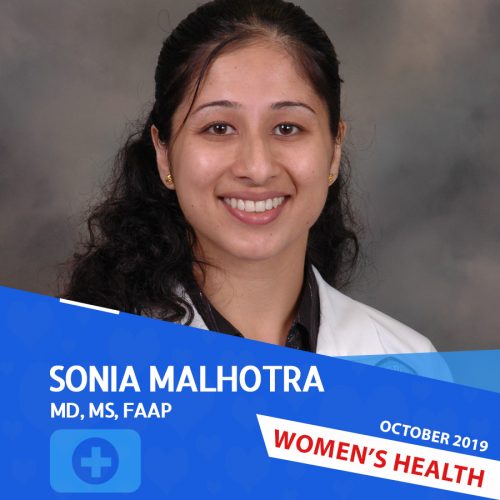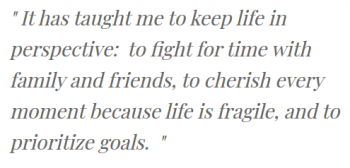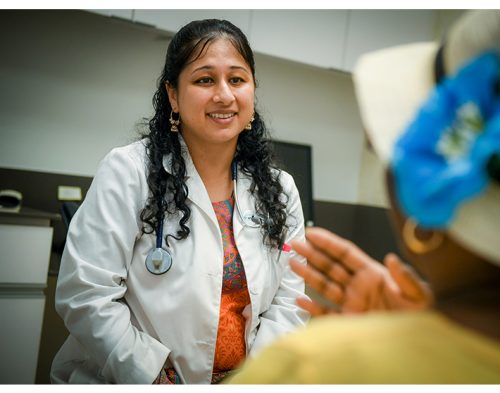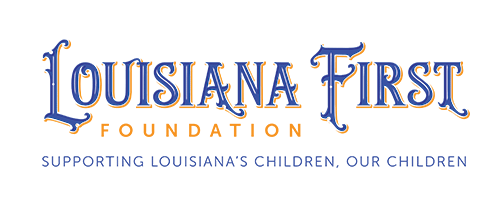Women\’s Health
WOMEN\'S HEALTH BLOG October 2019
Words from Sonia Malhotra, MD, MS, FAAP
Palliative Medicine & Supportive Care
“A pizza piadina sounds really good. Doc, thanks so much for bringing us food.”
Those were some of the last words I heard from my patient when I visited her at home while she was on hospice. My patient was dying from cancer and leaving her two young kids behind. I don’t know if I was emotional because she was leaving her kids or because I knew she wouldn’t get to watch her kids grow up. Or the fact that something she despised for so long due to the chemotherapy treatments received, was now actually sounding good. The least I could do was bring her something she would enjoy prior to the cancer taking a hold of her frail body as she took her last breaths. Especially since she loved food and it was all she spoke about through the course of treatment. Chemotherapy had changed her taste buds and the things that she enjoyed like pizza, were often things she couldn’t tolerate during her cancer treatment course.
Many people ask me if being an Adult and Pediatric Palliative Medicine Physician is tough. I am forthright in saying the field is not tough. Knowing that many of your patients will leave you is the tough part. In fact, I find that my field has given me more than what I will ever be able to give it. It has taught me to keep life in perspective: to fight for time with family and friends, to cherish every moment because life is fragile, and to prioritize goals.



Palliative Medicine is the care of any person LIVING with serious illness. Many people associate Palliative Medicine with dying and that is simply not the case. I have the privilege of caring for those living with advanced diseases such as cancer, heart failure, chronic lung disease, chronic liver disease, dementia, hematologic diseases such as hemophilia and sickle cell and a whole list of other diagnoses. In fact, some of my patients survive cancer and the care of those patients consists of managing the sequela of their disease including the symptoms left behind from various treatments undergone. Palliative Medicine consists of interdisciplinary care that focuses on pain and symptom management, communication on the progression or improvement of disease, advance care planning and emotional support. As a Palliative Medicine doctor I can help patients transition to home or nursing home services such as hospice when appropriate.
At University Medical Center, New Orleans (UMCNO), we have a Palliative Medicine & Supportive Care team that consists of Physicians, nurses, a physician assistant, social worker and chaplain. We have an Inpatient consultative service that is able to see patients in the emergency room or when admitted to the medical-surgical or intensive care units. We are one of few programs regionally that has its own free-standing Palliative Medicine clinic that is able to follow patients from the hospital to the outpatient setting and we receive referrals for outpatient care from other local clinic physicians. In both care settings we manage patients’ symptoms, cover crucial conversations and provide emotional support. Our social worker is able to provide individualized counseling for those patients living with serious illness who need further support. When patients are ready for and when it is appropriate in their disease course, we work with hospice agencies in the area to follow up on the care of patients and assist as needed with symptomatic and/or psychosocial challenges. Our program started in August of 2017 and has already seen thousands of patients from New Orleans, the Gulf Region and greater Louisiana. Our UMCNO Palliative Medicine team serves as educators for medical students, resident physicians and fellows from Tulane and LSU Schools of Medicine. Additionally we are providing Palliative Medicine education and training for staff and student nurses, nurse practitioners, physician assistants, pharmacists and social workers. We are working hard to provide each healthcare clinician who is training or working at UMCNO with some level of exposure to Palliative Medicine since each and every one of us at some point in life will encounter serious illness care.
At UMCNO, I have the privilege to care for a diverse group of patients who are from different racial, cultural, religious and economic backgrounds. The best part of my job is hearing where people come from, the experiences they have in life, how these experiences shape them into the person they are, how it impacts their care and how to translate this into a patient-doctor relationship. Often in medical training we are taught that we need to be “culturally competent.” As a woman of color, these terms never sat well with me because I didn’t understand how one person could be “competent” at knowing about all races, cultures, religions and socioeconomic backgrounds. I strive to teach “culturally humble” care, knowing that my patients have life experiences that impact the choices they make for their healthcare and how they would like me to care for them. I meet people where they are at and teach the R cubed: Building Rapport leads to a Relationship so Patients take our Recommendations.
Advancements in Medicine have really pushed the type of care we are able to provide. However, without an understanding of who our patients are, where they come from, and how they want to be cared for, it is tough to know which advances make sense for which patients. And often the true art of practicing Medicine is not simply offering the latest intervention. Sometimes it is as simple as getting to know our patients, their likes and dislikes, and the goals they have for their medical care so we can have honest conversations about treatments that make sense. This Rapport and Relationship building is the critical piece of Medicine that builds trust for the Recommendations Physicians are able to make.
My patient, who I cared for over a period of one and a half years, always talked about food at each clinic visit. Only from the Rapport I built, did a Relationship develop so she trusted my Recommendation to eat that pizza piadina.
My patient died one week later. I ordered a few meds to make her comfortable in that last week. However, my most important order for her was the following:
Daily Pizza Piadinas.
Dr. Sonia Malhotra is board certified in Internal Medicine, Pediatrics and Hospice & Palliative Medicine. She graduated from Ross University School of Medicine and completed Med-Peds residency training at Tulane University School of Medicine in New Orleans, LA. She completed an extra year of Chief Residency in the department of Pediatrics at Tulane School of Medicine. She moved to complete an Adult and Pediatric Hospice & Palliative Medicine Fellowship at the University of Pittsburgh. While at Pitt, she completed a Master’s in Medical Education at the Institute for Clinical Research and Education (ICRE) and successfully defended her dissertation on Pediatric Palliative Medicine Education and Training across Adult Hospice & Palliative Medicine Fellowships. She was recruited back to New Orleans in 2015 and developed Louisiana’s first Pediatric Palliative Medicine program at Ochsner Medical Center. She moved to University Medical Center New Orleans (UMCNO)/Tulane School of Medicine in July 2017 to start the region’s first Academic Palliative Medicine & Supportive Care program at UMCNO. She is an Assistant Professor of Internal Medicine & Pediatrics at Tulane School of Medicine and holds clinical appointments at LSU School of Medicine.

